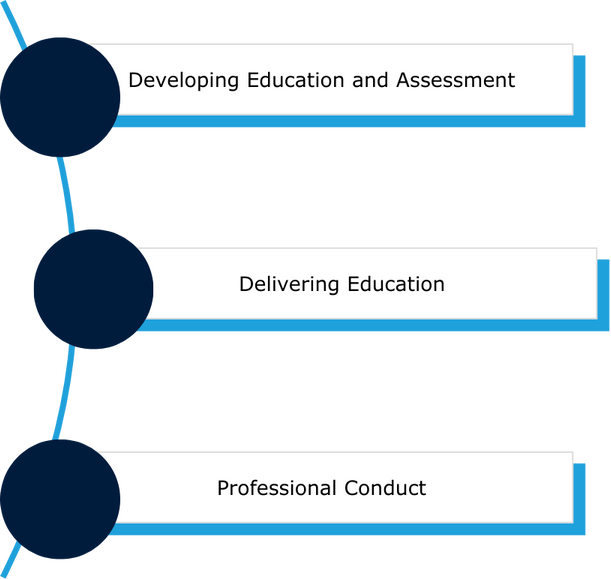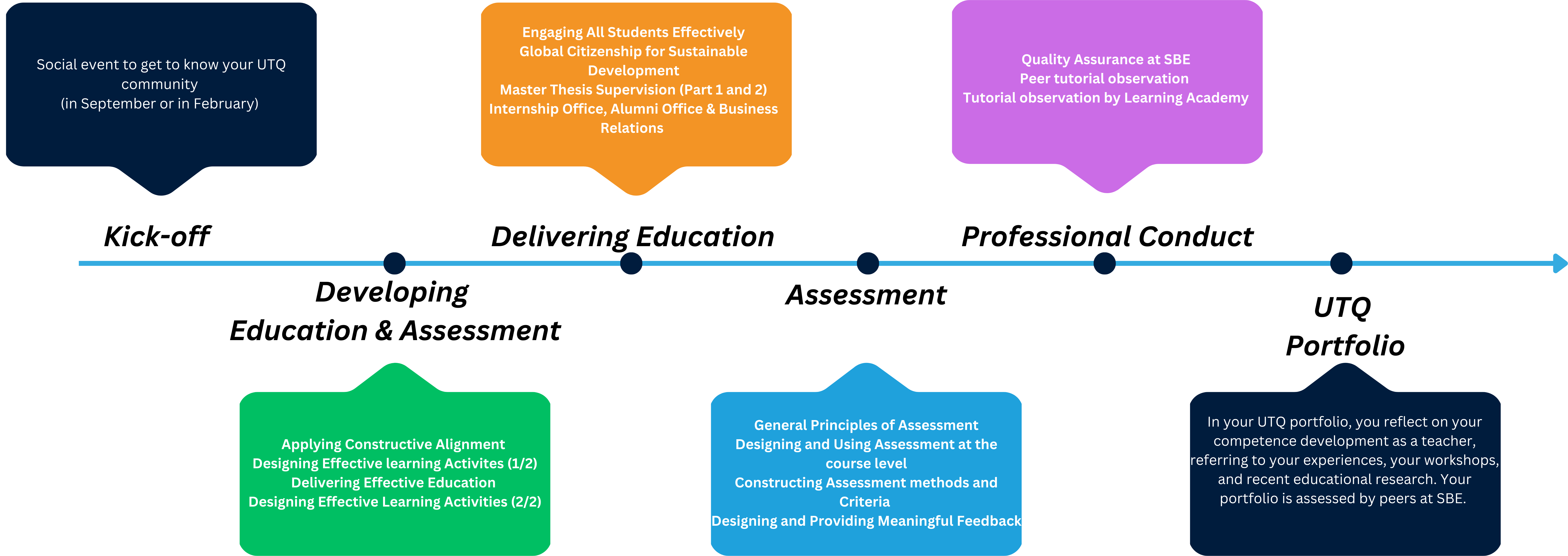UNIVERSITY TEACHER QUALIFICATION
FOR ALL TEACHING STAFF AT SBE
What is the university teaching qualification (UTQ / BKO)
The University Teaching Qualification, or Basiskwalificatie Onderwijs in Dutch (UTQ / BKO) is a mandatory teacher qualification programme for all staff members involved in course coordination at UM. This programme was designed to help teachers improve and develop theory and competences related to teaching and learning at our university.
The UTQ programme is part of the UM policy to qualify all teaching staff. UM faculties have agreed on the components of the programme. However, at each faculty, the programme is tailored for the specific needs of the teachers at the faculty.
All Dutch Universities accept each others UTQ certificate. The United Kingdom and Scandanavian countries, like Norway and Sweden, have similar obligatory teaching qualification degree.
Find the official UTQ manual of the university here.
ATTENTION! TEACHERS CAN START THE UTQ PROGRAMME EITHER IN SEPTEMBER OR IN FEBRUARY. PLEASE REGISTER FOR THE UTQ PROGRAMME AT LEAST ONE MONTH BEFORE YOUR PREFERRED START TO DISCUSS YOUR UTQ TRAJECTORY. FINAL REGISTRATION DEADLINES ARE SEPTEMBER 15TH AND FEBRUARY 15TH.
The UTQ Programme
The aim of the UTQ Programme is to support teachers as they develop and improve with regard to the competences needed for teaching at university, and to guide them in obtaining a UTQ certificate. Before teachers can start with the UTQ Programme, they first have to obtain their PBL & Tutor Training certificate.
The UTQ Programme consists of 3 phases:
Before Teachers start to develop the competences specified in the UTQ programme, they first need to fill in the UTQ Self-assessment form to assess their current skills regarding the UTQ competences, set personal development goals, and make a detailed action plan for their UTQ programme. Teachers are also required to draw up their educational CV
In the second phase, teachers develop their competences by acquiring relevant teaching experience. Meetings, literature, mandatory workshops, coaching, and feedback support them in completing the UTQ programme. An important goal is that teachers, based on educational principles, learn to evaluate their own teaching performance (and that of their colleagues), in order to come up with well-founded improvement proposals. Reflection is therefore a key component of the UTQ programme. Teachers compose a reflective UTQ portfolio in which they demonstrate that they have developed the UTQ competences and can apply them in their teaching.
In the UTQ portfolio, teachers are required to document and reflect on their development of 3 specific UTQ core competences.
For more information about the core competences, please see the University Teaching Qualification leaflet_UM_2024 p. 9-12.

The UTQ competences are assessed based on the UTQ criteria by reviewing the portfolio submitted by the teacher. The UTQ assessment committe, consisting of an educational director or other educational management representative and the UTQ coordinator, assesses the portfolio. The UTQ assessment committee plans a final meeting with you to discuss the portfolio and plans for further development. During this meeting your supervisor will also be present, however, he/she does not participate in the final decision about the UTQ portfolio. If you have shown that you meet the qualification criteria, you will receive a UTQ certificate.
Procedure
It normally takes about 2 years to obtain the UTQ certificate. All new staff members will be informed by the HR department about their UTQ requirement during the application procedure. Staff members need to contact the SBE Learning Academy to register for the programme. Former teaching experiences will be taken into account in defining a programme as tailor made as possible. Own teaching experiences will be analysed and transformed to new insights which can be used in the own teaching practice. Each participant is also advised to look for a mentor: a senior staff member of the department who will support and facilitate you during the trajectory.
Before staff members can start with the UTQ programme they first need to schedule an info meeting with a member of the UTQ team at SBE via sbe-la_utq@maastrichtuniversity.nl. During this meeting, applicants will be informed about the UTQ programme and its requirements. When staff members are able to meet the requirements of the programme, they receive more information on the intake (Phase 1). Furthermore, the heads of department need to provide each potential UTQ candidate with an official permission to start the UTQ programme.
UTQ Programme Requirements
You will need to follow a variety of workshops with a total workload of about 40 hours. Most of the workshops are provided twice a year. Additionally, you are required to schedule a tutorial observation with the UTQ coordinator to receive feedback on your teaching. Furthermore, social events are organised such as a kick-off for your UTQ community and writing sessions for the UTQ portfolio. See the following overview for the detailed requirements.

There is no specific sequence in which you need to follow the UTQ workshops. The workshops slightly build on each other but can also be followed independently from one another. The logical sequence within and between workshop categories is presented above.
You can find more information on all workshops offered for UTQ / BKO candidates here.
FREQUENTLY ASKED QUESTIONS
All staff members with course coordination responsibility are required to participate in the UTQ programme:
- Professors
- Associate professors
- Assistant professors
- Lecturer (1-3)
- Lecturer 4 with course coordination responsibilities
PhD candidates, post-docs, researchers, lecturers (without official course coordination responsibility) to participate in the programme if they have sufficient teaching responsibility. If you are a PhD candidate, post-doc, or researcher without official course coordination responsibility and you want to participate in the UTQ programme please talk to your supervisor about creating sufficient teaching and (un)official coordination responsibility. You need to have/get at least a course co-coordination role (being involved in course design and assessment decisions) to participate in the UTQ programme.
NO !
It is not possible to get an exemption for the UTQ programme based on earlier gained (teaching) qualifications or teaching experience. Staff members with extensive teaching experience and / or previously obtained teaching qualifications can apply for the PAC programme (previously acquired competences programme), a shortened version of the usual UTQ programme which grants exemptions for some to all UTQ wokshops. To apply for the PAC programme, please send an email to sbe-la_utq@maastrichtuniversity.nl including your motivation to apply for the PAC programme as well as your teaching CV including an overview of all of your past teaching activities, as well as a list and short description of each education-related workshop, training, programme etc. followed in the past.
YES!
In most cases. It is only possible to get an exemption for a UTQ workshop if the participant can show that they participated in a workshop that covered the same (or very similar) topics as the respective workshop.
NO!
The PBL & Tutor training offered by SBE is not part of the UTQ programme, however, all teachers who want to follow the UTQ programme first need to obtain their PBL and tutor training certificate.
YES!
Teachers for whom the UTQ programme is mandatory receive 40 teaching hours compensation for their participation. These hours are granted to the department once the UTQ certificate has been obtained.
